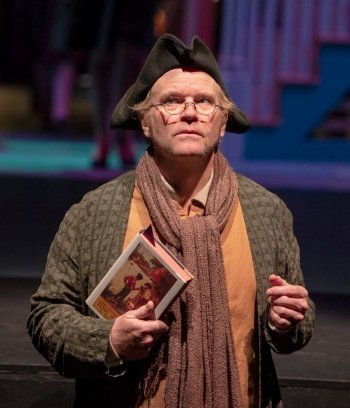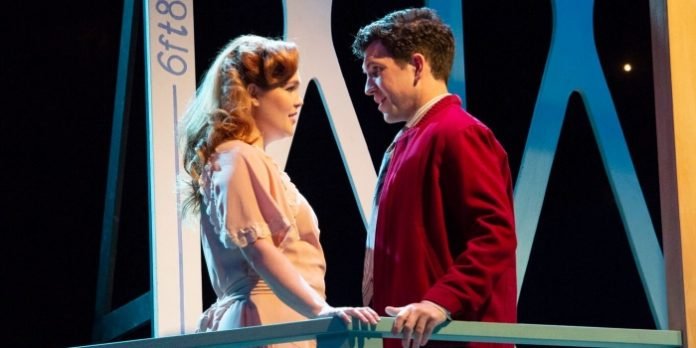Audiences can’t seem to get enough of It’s a Wonderful Life. Not only will the Frank Capra movie classic make its annual appearance on the small screen numerous times during the holiday season, it can also be seen on the big screen at several cinemas around the region.
Given its popularity, it was perhaps an inevitability that this uplifting yuletide story of George Bailey’s redemption would also receive a stage treatment from a local theatre company.
This year, the town of Bedford Falls hits the spotlight with a jukebox-esque musical makeover at Richmond’s Gateway Theatre.
Adapted and directed by Peter Jorgenson, this version of It’s a Wonderful Life not only hits the iconic moments from the film, it also features a string of holiday classics and songs from the 1920s through 1940s.
Including bookends of holiday standards “It Came Upon the Midnight Clear” and “Auld Lang Syne”, the bulk of the story is filled with both familiar and unfamiliar tunes from the likes of George & Ira Gershwin, Kurt Weill, and Alan Jay Lerner.
Rather than assisting to drive the narrative like a more traditional musical though, in Jorgenson’s adaptation the songs are used primarily as emotional emphasis to the action. For example, the Gershwin’s “Isn’t it a Pity” from the musical Pardon My English helps to underscore George and Mary’s reunion, while their “Nice Work if You Can Get It” becomes a song-and-dance number for George and Uncle Billy at Bailey Building and Loan.
In our recent interview with Jorgensen he talks of the redundancy of the film, finding “that often the same things were being said two or three times”. Cutting many of the scenes from the original, Jorgensen has simply replaced them with music. Ironically though, the use of songs of the era not only has the same effect, but also has a tendency to interrupt the narrative.
The result is not a much needed (and hoped for) reinvention of this ubiquitous holiday staple, but more of a sympathetic reinterpretation. And while the songs may have been chosen for their emotional resonance at a particular moment, it never quite reaches the magical heights of the still memorable Arts Club stage version by Philip Grecian.
But while this version of It’s a Wonderful Life may not have the full-on poignancy of its source material, or its recent stage cousin, it is filled with talent.

With terrific voices, Nick Fontaine and Erin Palm are a delight to watch and listen to as George and Mary. And while Fontaine had a tendency to occasionally channel a lesser Jimmy Stewart in his delivery, he still manages an endearing performance. Palm is rock solid.
The real star of this production though comes from Greg Armstrong-Morris’s portrayal of angel-second-class, Clarence. Fully engaged even while simply watching the story unfold before him, Armstrong-Morris captures the wit and child-like wonder of this heavenly being.
There is some welcome diversity to the other members of this cast, including Gateway Theatre’s artistic director Jovanni Sy. In a wink, he is cast as both George’s father and slumlord, Henry Potter.
Under Jorgensen’s direction, the transitions between locations is often seamless by providing enough focus on the action while the cast moves Brian Bell’s set pieces. There is an awkwardness though to the placement of the central door which characters are forced to enter upstage, only to turn around and enter through a downstage opening.
Under the direction of music director Angus Kellett, the ten piece orchestra are simply superb, who along with the songs underscore some of the action with incidental music, providing a familiar cinematic quality.
In our time of social upheaval and political unrest it is perhaps inevitable that a seventy year-old story can still remind us of what really is important. And while this reinterpretation of It’s a Wonderful Life doesn’t bring anything new to its story, it remains a much-needed nostalgic souvenir.
It’s a Wonderful Life adapted by Peter Jorgensen based on the Frank Capra film and the original story by Philip Van Doren Stern. Directed by Peter Jorgensen. A Gateway Theatre production with support of Patrick Street Productions. On stage at Gateway Theatre (6500 Gilbert Rd, Richmond) until December 31. Visit gatewaytheatre.com for tickets and information.

